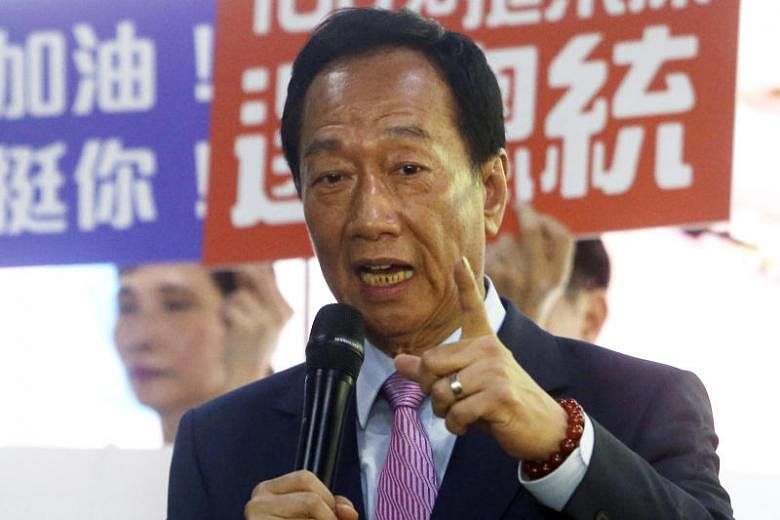BEIJING - Taiwan's richest man Terry Gou has dropped out of the 2020 presidential election, in a surprise move that may give the island's main opposition party a much-needed boost.
"My original intention of running for president was: I hoped to lead Taiwan society to fight for the economy," said the founder and chairman of Foxconn Technology Group late on Monday (Sept 16), in reference to the island's economic slowdown.
"But...I saw some politicians stir up hatred between classes, confrontation and nationalism for their personal interests," he said, referring to anti-China rhetoric by unnamed politicians.
"I hope society can return to rational thinking and discussions on policies when choosing our leader," he added.
In April, Mr Gou said he decided to join the presidential race. He took part in the primaries of the main opposition Kuomintang (KMT), or Nationalist Party, but lost to Mr Han Kuo-yu, mayor of the southern port city of Kaohsiung. Last Thursday, he quit the party.
Analysts said Mr Gou's withdrawal from the race may give a boost to the KMT and its standard-bearer Mr Han.
"Mr Gou's pulling out eases a crisis for the KMT, preventing a split," political commentator Wang Ming-yi said in an interview.
Ranked the world's 182nd richest person, Mr Gou is worth about US$7.5 billion (S$10.3 billion) in 2017, according to Forbes. FoxConn is the world's largest assembler of consumer electronics, which employs more than one million people and assembles iPhones and iPads for Apple, mainly in China.
Speculation had been rife that Mr Gou and Taipei mayor Ko Wen-je, an independent and a dark horse, would form a joint ticket, which would have been a formidable challenge to both the KMT and the ruling Democratic Progressive Party (DPP). It is unclear now if Mr Ko would join the fray.
Political parties with representation in parliament will nominate their candidates in November.
It is unclear who President Tsai Ing-wen and Mr Han will nominate as their running mates.
"There are contradictions, but we cannot rule out the possibility of Han Kuo-yu making Terry Gou his running mate," said Mr Wang.
In another last-minute surprise, former vice-president Annette Lu announced her candidacy as an independent, but analysts said the 75-year-old is unlikely to steal many votes from the DPP.
The Jan 11 elections will be a showdown pitting President Tsai against Mr Han. A survey released by TVBS cable news network last week showed Ms Tsai receiving the support of 49 per cent of respondents, while Mr Han came in second with 42 per cent.
In the months ahead, candidates will debate the pros and cons of seeking rapprochement or confrontation with China, which has claimed the self-ruled island as its own since 1949 when the KMT lost the civil war to the Communists and fled to Taiwan.
Beijing favours the KMT, which espouses eventual reunification with a democratic China. It has stonewalled the pro-independence DPP since Ms Tsai won the election in 2016.
In August, China froze individual travel to Taiwan in an apparent tit-for-tat after Ms Tsai offered asylum to Hong Kong protest leaders.
The turbulence in Hong Kong has boosted Ms Tsai's chances of re-election, analysts said. She has rejected China's reunification overtures under the "one country, two systems" formula.


